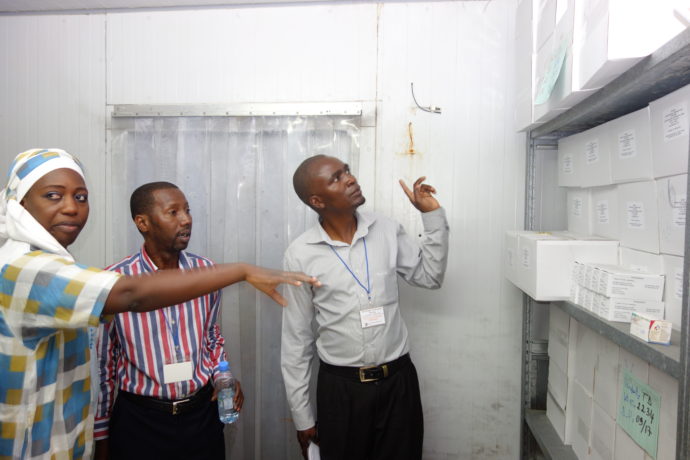The BID Initiative Story
Laying the Groundwork
Laying the groundwork through partnerships and user-centered design
The BID Initiative began with collaborative, country-driven planning involving members from all levels of the health system to ensure that solutions would meet local needs and challenges. By engaging multiple countries in sub-Saharan Africa, we determined their most critical immunization service delivery problems and related data challenges. We then worked with technology developers to explore digital solutions that could be coupled with change management approaches to encourage adoption of the digital solutions and increase use of the data captured. We partnered with two countries, Tanzania and Zambia, to lead the implementation, and we established a peer learning network for countries across sub-Saharan Africa to share information, tools, and lessons learned.
Identifying country partners committed to designing and advocating for data quality and use interventions
The “last mile” references the final challenges a country faces as it works to vaccinate all members of its communities and achieve full immunization coverage. At the root of this challenge are fragmented and weak information systems. BID conducted a landscape assessment to identify ten potential demonstration countries where accurate, timely, and accessible data could be used to ensure the right vaccines are administered to the right people, at the right times. BID and its partners then convened representatives from all ten countries for a consultation meeting in Nairobi, Kenya, to get a better sense of the data-related opportunities and barriers to closing the immunization gap.
Despite the challenge before them, countries agreed on the need to prioritize improvements in information systems. Their enthusiasm and commitment were unwavering. Although the purpose of the country consultation meeting was to exchange knowledge around information systems and data management policies needed to strengthen immunization programs, it was also an opportunity to forge partnerships. Tanzania and Zambia emerged with strong ambitions and dedicated commitment to improving immunization data, quality, and use. BID worked with the governments of both demonstration countries to designate a region or province to initiate work on interventions with the goal to test, refine, and then scale up. In Tanzania, the Arusha region represented a unique opportunity and series of immunization challenges due to its porous border with Kenya, pastoral populations, and variations in urban, peri-urban, and rural settings. In Zambia, the government visited health facilities in four districts and, after observing strengths and opportunities as well as the presence of key challenges, identified Southern Province as the strongest region for BID’s initial demonstration.
“Data is not just for policy and planning, but it is also for service delivery. Investing in terms of infrastructure is one thing, but more so our desire is to invest critically in human resources – [the] people that are going to look at numbers and make decisions based on those numbers. [Health workers] are used to collecting data, but there hasn’t been a need for them to critically look at the numbers…Our desire is to transcribe that information into people and realize that every digit that goes on record is a human.”
– Dr. Mpoki Ulisubisya, Permanent Secretary of Tanzania’s Ministry of Health, Community Development, Gender, Elderly, and Children
Because many countries were grappling with the same issues, participants suggested establishing an African-led, peer learning network—to be known as the BID Learning Network, or BLN. The BLN would bring together digital health experts and immunization program leaders from across sub-Saharan Africa to exchange experiences in implementing electronic immunization registries, data management systems, change management approaches, and data use policies and practices. Despite their varying health landscapes, the more than 20 participating countries involved in the BLN share many common challenges and potential areas of learning.
Convening technology developers to identify promising tools for testing
Now that BID had a roadmap forward, we needed to understand how to get there. Digital tools present one solution to closing the immunization gap. In December 2013, the BID Initiative held a Tools Developer Summit in Washington, DC. Groups that develop information and communication technologies joined BID, partners, and donors to provide a deeper understanding of the tools available to improve immunization information systems. These ranged from electronic immunization registries to SMS systems, GIS technologies, and even biometric tools.
Using a series of lightning talks and breakout sessions, summit participants focused on how these technologies could be used for communication, patient identification, and supply chain management. BID asked for “there’s an app for that” opportunities—situations where new ideas or an integration of existing ideas would help improve data and processes related to immunization. Throughout the BID Initiative, this group collaborated to explore solutions for information system challenges in sub-Saharan Africa.
Outlining a standard process for designing an information system
Building on previous work by PATH, the Public Health Informatics Institute, and other groups, we led development of a product vision document outlining a process for designing a scalable immunization information system. Representatives from Tanzania, Zambia, and other BLN countries contributed to the document’s development.
In seven chapters, the product vision document outlines a series of steps for gathering and organizing needed information. Chapters cover topics such as user personas, business processes, user and system requirements, and use scenarios.
BID Initiative theory of change
The journey to scale: Moving together past digital health pilots
Establishing the BID Learning Network
Sometimes the best solutions have a deceptively simple answer, or the solution already exists. Peer learning networks are an opportunity for professionals working across a range of workplaces, sectors, and countries to swap experiences, share best practices, and adapt defined solutions to their own contexts, so as not to reinvent the wheel. Throughout BID’s journey, the BLN has been a platform for this sharing, fostering continuous learning and communication among countries.
In May 2014, representatives from 13 different countries and international partners assembled in Kigali, Rwanda, for the formal launch of the BLN. The dynamic convening allowed members to talk and work directly with others in the same space, to strengthen immunization programs through innovations in data availability, quality, and use.

Photo: PATH/Dawn Seymour. On a field visit during a BLN meeting in Dakar, Senegal, participants visited the National Procurement Pharmacy and learned about Senegal’s use of Logistics Management Information Systems. Field visits brought digital solutions to life and helped participating countries understand how these tools might be adapted for their own country contexts.
“The value in peer learning is enormous. You can’t quantify it. When my peer trains me, I understand it better…Because most of us come from the same environment.”
– Dominic Kwabena Atweam, BLN member and Policy Planning Monitoring and Evaluation Division, Ghana Health Service
BLN meeting dates/locations/topics
May 2014: BLN launch (Rwanda)
Dec 2014: Design collaborative (Zambia) – Electronic registries
May 2015: Design collaborative (Senegal) – Logistics Management Information Systems
Dec 2015: Discussion meeting (Tanzania) – BID Initiative progress in Tanzania and Zambia
May 2016: Design collaborative (Ghana) – Electronic registries
July 2016: Study visit (Benin) – VaxTrac implementation
Nov 2016: Design collaborative (Uganda) – Change management
Sept 2017: Discussion meeting (Zambia) – BID Initiative progress and future prospects
The BLN embodies demand-driven and African-led solutions. So, when BLN members met again later that year at the first Design Collaborative in Lusaka, Zambia, participants took full charge of the agenda. The subsequent Design Collaboratives held across Africa focused on country-identified priorities such as immunization registries, change management, and supply chain logistics.
Between meetings, BLN members provided input on the design and testing of data quality and use interventions for Tanzania and Zambia and shared learnings through webinars, an online discussion forum, and our BLN Resource Library. The network provides an opportunity for other countries interested in improving their health programs through better data and decision-making to adopt aspects of the BID Initiative and adapt them for their own country context. For example, through the small grant program, The Gambia developed an immunization registry, called E-Tracker, and piloted its use in the Western Health Region. If the pilot proves successful, The Gambia is expected to scale the system nationally.





